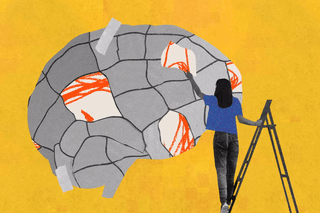
Society Idealizes Having a Great Memory. But What if It’s Better to Forget?
The key to better relationships and mental health lies in striking the right balance between remembering and forgetting things.

“You remember the clothes I was wearing at her wedding four years ago… This is some impressive memory you got!”
“Wow, you manage to remember all of our birthdays every single year without using reminders even. Please tell me what to do to make my memory great too!”
“I’m so blown away by you remembering the exact date of a party from two years ago that you didn’t even end up attending!”
As a society, we treat great long-term memories as aspirational, with thousands of articles on foods and exercises that can help us achieve that. Pop culture, too, idolizes it — with Mike Ross in Suits, Rancho in 3 Idiots, or Sheldon Cooper in The Big Bang Theory deemed “gifted.” And there’s no doubt that having a great memory can be quite useful. “It came really handy to navigate the meritocratic system of education in India,” says Anshita Koul, 35. Her ability to remember people’s birthdays — alongside all important dates and deadlines — also helped her convince others of how thoughtful and responsible she was.
However, as we have always been taught: too much of anything is bad. Having a great memory, too, isn’t without its fair share of downsides. It might seem incredibly romantic, for instance, to have a partner who is able to recall every big and small milestone of their relationship in vivid detail — down to the weather, the traffic, the color of their partner’s lipstick, the food they shared, and the drink they considered ordering, but didn’t.
For one, remembering more than others can be rather lonely. The fact that no one — not even one’s partner — can recall all the big and small moments they shared together, can be an isolating experience. “I feel that these long-term memories can’t be shared because only you can remember them,” says Preety, 31. For her, that’s a certain downside of living with a great memory.
Related on The Swaddle:
Why Sexual Abuse Survivors Often Have Distorted or Delayed Memories
Further, there’s another disadvantage to remembering every detail about relationships — romantic or platonic. Through the course of life, we break up with a number of partners and friends, and the separation isn’t always painless. And so, it can be exhausting to live with memories that serve as constant — and often wistful — reminders of dinner dates every time one passes by restaurants they once frequented, of a movie they watched or dissected with their former best friend every time songs from its album are played at parties, or of places they had planned to visit with their former partner every time someone on social media posts pictures while vacationing there. Even years after one has moved on, almost every time they turn a corner, there’s a reminder of the past lurking. While the reminders may not rake up heartaches each time, they do bring back memories that are unpleasant — and that too, rather ceaselessly.
“Everything haunts you. They play like reels in your mind — over and over again,” Yuvraj, 29, says. But it’s not just bad experiences he’s wary of remembering; good memories can be pretty tormenting too. “Some might make you smile or feel good momentarily, but there are some that you are almost trapped in,” he says. The latter kind makes him “look down on the present [moment], which might be good enough” — except, he compares it with and expects it to give him the “same level of happiness” a past happy memory had.
Koul, too, agrees, “[A]s I grew older, I realized that most memories came with a stain.” Diagnosed with complex post-traumatic stress disorder (C-PTSD) last year, she joked, “For people with C-PTSD, every day is a ‘throwback Thursday.'” She says her diagnosis made her realize how much of a “bane” it is to live with a great memory. “It wakes me up in the middle of the night. It makes me freeze in the middle of grocery shopping while I disassociate from reliving some traumas.”
Living with a better-than-average long-term memory can impact our equations with people, too. “Because I remember too much, I also hold on to grudges more. It’s very very difficult for me to forget or move past someone who, I feel, has wronged me. This may even be a perceived wrong but it stays in my memory forever,” Aditi, 30, says. Not only that, “I remember every tiny thing that people say and do. Because of that, I tend to be very literal about what they say whereas people usually don’t remember such small nuances. To me, it’s almost like they’re going back on their word,” she says.
It’s almost as if what makes relationships richer, and bonds stronger is finding the right balance between not forgetting important details about people we care about, and not remembering every time they disappointed us or caused us to hurt. Constantly living in the memory of the pain inflicted by a loved one — remembering in vivid detail everything from the tone of their voice, the expression of apathy on their face, every emotional wound their words meted out, and every sensory stimulus that lingered around them — can complicate forgiveness, and at times, make relationships unsalvageable.
Related on The Swaddle:
Why Scents Evoke Such Strong Memories
“Memory and forgetting work in unison. We depend on our memory to record, to learn, and to recall, and we depend on forgetting to countervail, to sculpt, and to squelch our memories,” Scott Small, a neuroscientist and author of Forgetting: The Benefits of Not Remembering, wrote in The New York Times. “This balancing act is, as it turns out, vital for our cognitive functioning, creativity, and mental health.”
Research also suggests that having a great long-term memory can have an adverse impact on an individual’s working memory, which holds small amounts of information one might need to make decisions, organize tasks, or simply, to reason. A study conducted on mice suggests that “hav[ing] too much memory … mak[es] it harder to filter out information and increas[es] the time it takes for new short-term memories to be processed and stored,” explains an article on the website of Columbia University Irving Medical Center.
“Sometimes I don’t remember what happened five minutes ago, but I can remember a detail from 22 January 2008,” Bill, an individual with a “highly superior autobiographical memory,” told BBC Future in 2016.
Basically, not only does my “amazing” long-term memory give me painful flashbacks and make it difficult for me to recover from grief and trauma, but also affects my ability to function — by impacting my working memory, which, in turn, makes it challenging for me to perform the most “basic” of tasks.
So, while having a great long-term memory may seem enviable, there are a multitude of reasons that, in reality, can make it a traumatic — and even debilitating — experience. As Small noted, “…there is a danger in remembering too much” and that “forgetting is not only normal but in fact necessary for our mental health.”
Devrupa Rakshit is an Associate Editor at The Swaddle. She is a lawyer by education, a poet by accident, a painter by shaukh, and autistic by birth. You can find her on Instagram @devruparakshit.
Related


Why It Is Hard to Make Some Decisions – and Not Others
